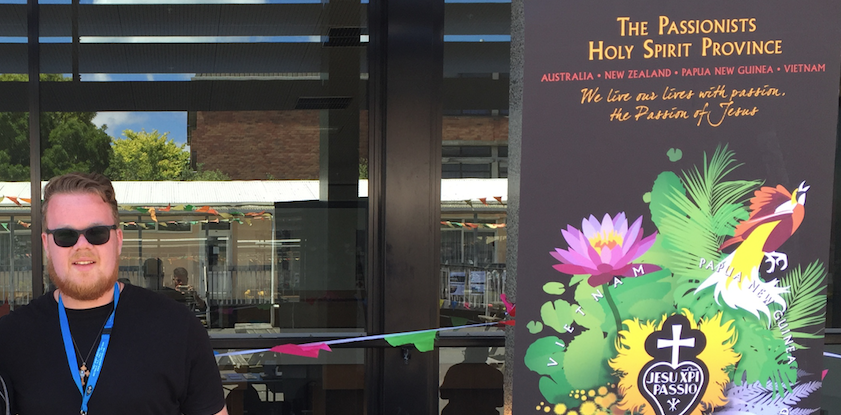I’ve always had a bit of a sceptical eye when it came to saints and devotions to saints. I mean, my prayer life has never really included prayers to the saints asking for intercessions and all of that, nor have I really put much stock in the idea of saints themselves. I remember before I joined the Passionists, I had a really close friend of mine whom I met on our Youth Team in Brisbane. Now, he was El Salvadorian, so his family was really big on devotions and the saints etc, especially those to Our Lady and I was really close with them so when I told them that I was discerning Passionist life, I started to get a constant stream of Marian devotion booklets, posters, pictures, rosaries: you name it. If there was anything even slightly related to Mary around their house, it was quickly passed on to me whenever I visited. Now there was no way I wanted to offend them in anyway, so I’d say thanks each time, and take them because I figured it’d be rude to say, “no thanks.”
Up until the start of last year, when Brian Traynor gave me the topic of “St Gabriel and Youth” to work on over my pastoral month, I always thought that looking up to the saints was pretty pointless. I guess that the core of this was the fact that the saints are oftentimes portrayed as these god-like beings, beings that we as humans, could never even dream of matching up to. However, once I started reading up on St Gabriel, something awesome happened. I started to see this human who was not so different from myself before he became a Passionist. So, the focus of this reflection isn’t really St Gabriel; it is more the very human Francis Possenti; the man before the saint.
I’d like to share about this normal, average young man from Assisi, who was to become the Patron Saint of Youth. I’d also like to share a bit about who he is for us living in the 21st century, and most importantly what does his life mean for Passionist youth, but really for anyone living in the 21st century, where we’re surrounded by materialism and consumerism at every turn. I’m not going to be focussing on his ‘great deeds’ but rather about his ‘average’ life, in order to hopefully show that all saints start somewhere.
Before he joined the Passionists, Gabriel was known as Francis Joseph Vincent Rufinus Possenti and was born on March 1, 1838 to his parents Sante and Agnes. He was born in Assisi, Italy, the city that also happened to be home to St. Francis of Assisi. He was part of a large family, the eleventh of thirteen children – which happened to be a pretty common sized family during that time. He was baptised on the day he was born at the Cathedral of Rufino, which is the same place that St Francis and St Clare were baptised. His family had already lost two of their children during their infancy before Francis was born and because of his mother’s ill health Francis was sent to a wet nurse for the first year of his life.
Francis went on to be raised in an average middle class Italian family, with loving parents and active and playful siblings; however, he also saw a fair share of suffering in his life. By the time he was four, two of his sisters had passed away, and he’d moved around the country countless times due to his father’s role as a Papal governor, delegate and assessor. This most likely left some sort of lasting effect on him. He was extremely close to his mother, who was a very prayerful and kind woman. She would often be surprised when he would follow her into the ‘chapel’ in their house. So it came as a shock to the four year old Francis, when his mother passed away from meningitis at the young age of 42. This pain over losing his mother was reflected in some of his final years where he took the name, “Gabriel Possenti of Our Lady of Sorrows.” It’s very likely that it was the sorrow over losing his mother that went on to inspire his deep devotion to Our Lady of Sorrows.
On the whole, it seems as though he lived a pretty normal childhood and was described as “… sensible, sweet and a great sweet-talker, but also quarrelsome with his brothers and sisters, impulsive, and a bit unruly,” and “… the liveliest of all the children.” I got the impression that although he lost a lot in terms of guidance and maternal love through the loss of his mother, he was still turning out to be a pretty good kid, always willing to give to others the things he had. He was especially drawn to the needs of the poor and needy. “He could not endure seeing another suffer unjustly, and he was always prepared to defend a weaker companion…”
Once he turned six, he began studying under the Christian Brothers where, to his father’s happiness, he did really well. During his time with the Christian Brothers, he started to learn and understand more and more about the Christian life and it was through this experience that his devotion to Mary began to grow. After he turned twelve, he went on to do secondary school with the Jesuits with one of his professors writing, “He was a very talented student, certainly one of our most brilliant boys…” He went on to graduate with excellent marks in both Latin and Greek after six years with the Jesuits.
All through this time, Francis was pretty much your average young boy, very active and full of life. He was very interested in hunting – as this was the only sport at the time – and he was always playing with his friends. Something else that was quite common for him was arriving home covered in bruises from fights that he’d been in on his way home from school.
It was during his adolescence that Francis began to enter into a different environment, he began to attend parties with his father and brothers as well as attending the theatre, acting in plays and dancing whenever he could (he’s said to have been an excellent dancer!) This is where another trait of his youth started to come through: his vanity!! Francis was always very attentive to how he dressed, always keeping up with the current trends; wearing the right colognes; making sure he was groomed well, always having his hair parted and combed with gel. I read a book that sums him up as “Attractive, pleasant, kind and friendly,” whilst at the same time, “… vain, ambitious, frivolous and worldly.” However, basically we can say that he was a very good looking young man, and that his external beauty was well matched with his internal beauty. His attraction to the ‘party life,’ or social scene of his day really can’t be overstated. One of his college classmates had this to say about him: “Parties and amusements, good company and good times – these were the things to which he gave all his attention.”
During this fun-filled period of his life, there was something stirring within him that was calling him somewhere else, he was beginning to feel dissatisfied with the way he had lived his life so far – something he would continue to mourn over until his death. This ‘calling’ was not fully realised until the death of his older sister, Mary. He was extremely close with his sister, who was nine years older than him and due to the death of his mother, Mary had become the main maternal figure in his life, “… part mother, part sister, and part girlfriend all rolled into one.” So, it’s easy to see that her death came as a massive loss to Francis and resulted in him beginning to realise his true vocational calling.
It wasn’t long after this that he attended a thanksgiving procession for the Madonna on the feast of the Assumption. During the procession, he looked to the image of Our Lady and saw her eyes move in his direction and her lips tell him to join the Religious Life. This is basically where life took a turn for him.
He immediately went to talk with one of his teachers, a Jesuit Priest, to tell him what had happened and after a long discussion, he announced that he wanted to join the Passionists. He’d spoken to his father a lot about joining the Jesuits, who had a lot of cultural ‘prestige’ and a pretty good lifestyle, however his decision to join the Passionists came as a major shock to his father. Unlike today, the Passionists of the 18th and 19th centuries lived a very austere and penitential life – which was basically the complete opposite of Francis’ lifestyle at the time. However, it’s said that his father realised that Francis was no longer the same young and impetuous boy, he knew that he was serious about this.
With his father’s reluctant blessing, and after an unusually quick response from the Passionists, he was soon accepted into the Passionist novitiate and within two months, he began his travel preparations. His father attempted to dissuade him through interventions by his brother and uncle, however nothing they did changed his mind in the slightest. The moment he entered the Passionist house at Morrovalle, one hundred and twenty kilometres east of Assisi, he was welcomed with such great hospitality and love that it moved his Dominican uncle to tears.
A quote from a book I read said, “It seemed as though he was born there.” He’d really found his calling and was overjoyed to be living it, taking up the name, “Gabriel of Our Lady of Sorrows.” He is described as being “stricken” with his new way of life, the Rule he now followed, and the daily rhythms, and is quoted saying, “If I had to choose a congregation all over again, I would take this one a thousand times over!” During the time he spent as a Passionist it was “possible to see that his life was a continual encounter with God.” This sense of conviction, of enthusiasm and raw passion is reflective not only of who he was as a person, but also the charism and lifestyle of the Passionists. It is said that from the Passionists, he learnt how to channel his feelings and put his “whole heart” into whatever it was that he was doing. St Paul of the Cross strongly believed in the movement of the Spirit and therefore never set rigid rules in regard to spirituality, ministry or prayer. Rather, he preferred the Spirit’s creativity to work through each member, and in this case, it would continue to work through Gabriel’s whole-hearted passion and enthusiasm for God.
Emotionally and spiritually, Francis went from strength to strength, however physically he was deteriorating. Around the beginning of 1861 his health took a major turn, seeing him coughing up blood with the beginning of Tuberculosis, which during the 19th century was incurable and in most cases, fatal. Through this time, he is still described as being “interiorly joyful.” After five and a half years with the Passionists and at the young age of twenty-three, Gabriel Possenti passed away on February 27, 1862.
As I outlined at the beginning, after doing all this research and putting this presentation together, I started to see similarities between myself and Francis. Life him, before I joined the Passionists, I was very caught up in the ‘party life.’ I loved going out on the weekends to clubs and pubs with my friends, we all had heaps of fun and really lived for the weekend (as my photos reveal). I couldn’t help but put that quote in earlier because it reminded me of my first few years out of school, “Parties and amusements, good company and good times – these were the things to which he gave all his attention.” Now, I didn’t have quite the experience that Francis had that called me to join the Passionists, but I do remember having a deep conviction and a stirring within through this all this, that I needed to join.
Like Francis, my dad thought that this was just another impetuous decision and that I would probably change my mind in a few months. I most definitely don’t blame him, either. I’d gone from school into Landscape Architecture, then to Psychology and then one day I told him I wanted to be a priest! However, once I joined, I had a very similar experience of falling in love with the Passionists and their way of life and both my parents now understand this to be something far deeper than what any of us originally thought.
I’d like to clarify that I am in no way trying to set myself up as a saint here. What I am trying to repeat is that we seem to have this understanding of saints being otherworldly, people without blemish, however as we’ve seen: that’s not Francis Possenti. I found a saint that I could relate to on a personal level, one whose life reflected some of my journey, and that, for me, was extremely surprising and somewhat comforting.
Francis was basically an average kid, with an average upbringing. He was no different from you or I, and was described as, “a red-blooded boy, full of youthful mischief, but good and sincere at heart.” That sounds very much like myself and a lot of my friends, not only growing up, but still today! Where can we go from there? What can we learn from this? Shakespeare once wrote:
They say the best men [sic] are moulded out of faults,
And for the most part become much more the better
For being a little bad.
Gabriel is a pure example of this, living through his active and mischievous childhood and adolescence to become the patron saint of youth. Upon joining the Passionists, it was as if he completely embraced God. I feel like this is what the youth of the 21st century can learn from him: a willingness to love and be loved by God, a complete and utter surrender to God.
Gabriel embraced a radical way of living as a Christian, through love and self-giving, and through this, he was able to know God on a deeper level than any other person his age. This is what I feel my generation is being called to do through his example: allow God to become the centre of our lives. Not only my generation, but anyone who comes into contact with Gabriel’s story, which now includes anyone who has read this! We do not have to sever all ties with the material world as Gabriel did, but we can look to his example for strength and guidance in everything we do as followers of Christ.
We’re bombarded by materialism and consumerism every single day, however we are able to look to Gabriel for guidance. Even more than 150 years later, we can use his example to live lives of love, goodness and generosity, no matter what stage of growth we’re at.
Gabriel lived his life with enthusiasm and with heart. He was a person of conviction and passion. This is a Passionist trait, something that we can all take away. If we’re able to live our lives in such a way that they begin to reflect the unrestrained passion that Gabriel lived as well as the unfettered love for God, then we’ll be well on our way to sainthood, too!
Luke Bulley CP

